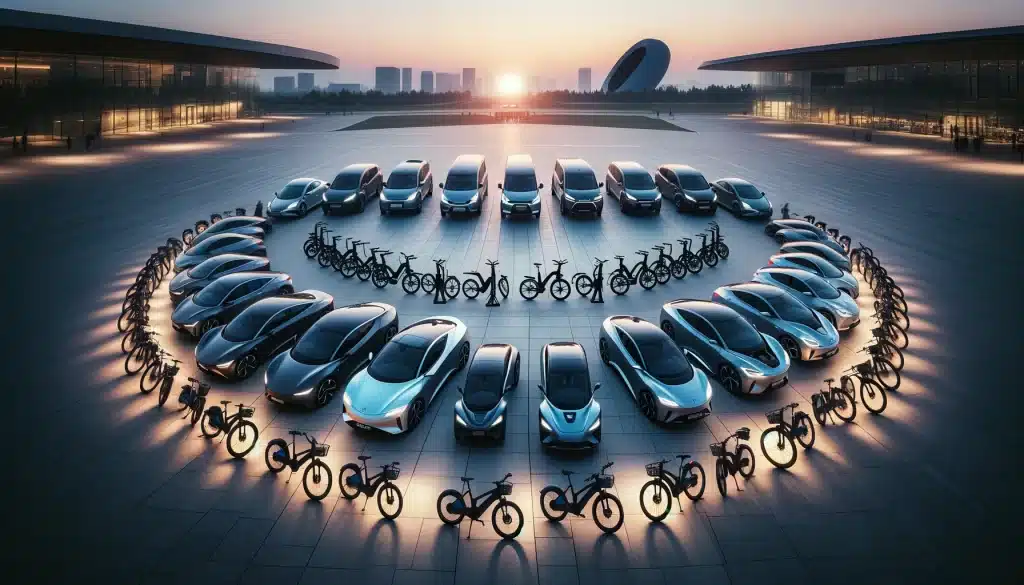Edward Benjamin
Chairman, Light Electric Vehicle Association
Senior Managing Director, eCycleElectric Consultants
March 2024

Mistakes Made by Automotive Companies in the Ebike Market
Electric bicycles are now an important category of transportation tools. Sales growth (Global) has climbed from hundreds of thousands to many millions today and despite some challenges and difficulties, promises to climb even further. (Probably 50 million + in 2024)
As a veteran of this business, I am often asked “Why didn’t the automotive, or Motocycle giants of the world step in and dominate this industry?”
The answer is: They have tried. Doubtless they will keep trying. But there is a common point of failure.
Along with being an observer, I have worked on projects for 4 of the world’s largest motorcycle makers, 3 of the largest auto makers, and several tier one auto parts suppliers. So my observations here are pretty much eye-witness.
The period of time starts with legendary Auto guy Lee Iacocca’s 1997-98 effort to build and sell electric bikes in the USA. His idea was to offer a $1000.00 retail ebike through car dealers, and that car dealers would support, buy, and sell these much the way they handled cars.
While creating a good, 1000 dollar bike in the late 90’s was a challenge…a bigger challenge was the culture and economics of the car dealers. Car salesmen were not used to the idea of such a low priced vehicle, did not want to spend time on such a low commission. And the dealers learned that the costs of servicing these bikes meant that the space, parts, and training commitment did not make money they way a car service bay did.
Another example, a few years later would be Ford offering an ebike to a select Asian market, that was based on an existing ebike of poor performance. Not a success. (About 2000)
That was followed by a business unit of Ford (Th!nk) offering ebikes made by Giant that were never really accepted by the automobile retail channel. (2001)
In Asia, Honda. Panasonic, and Yamaha and others offered PAS paradigm bikes that were successful in Japan, where a low speed, low power bike was mandated by law. But repeated efforts to expand these sales in to other markets met with failure. The bike were not big enough, not powerful enough, not fast enough, and their automotive / power sports retail channels would not support them. (1994-today)
It is worth noting that Panasonic was successful selling their propulsion system to both Asian and Western ebike brands, until the introduction of Bosch propulsion systems in 2010. Since both of these are Tier one parts makers, they are included. Notably, they relied on bike brands to sell the bikes.
A number of European auto makers have presented electric bikes: BMW, Mercedes, Porsche, Skoda, Matra, VW, and more. While some are still on offer, notable success has not yet occurred to the knowledge of this writer. These efforts have spanned 1998 to present. I defer to my European friends as to why, but I suspect the problems are the same as in the USA: The product was / is not quite right, expensive, and the dealer channels are not supportive. Selling the goods is the problem.
Before going on, I would like to make the point that there are a number of ebikes that have been labeled with famous auto brand names licensees. These are bicycle companies that pay for the use of the famous name, but a “Ford” bike from Pedego, or a “Jeep” from several bike makers has little to do with the famous auto or Motorcycle maker.
GM created a brilliant electric bike, (2016-2020), but failed to sell it. The technological ingenuity in the design was not important to the consumers, and while the engineers were brilliant, the sales team was not effective. Supposedly the project was a casualty of COVID….
Mando, a business inside the Halla Group, part of Hyundai, created a brilliantly engineered, chainless bike in 2015. Pedal power was instantly turned into electricity to power the hub motor. While innovative and beautiful, the bike failed to sell in any numbers.
Harley Davidson created a brilliantly engineered, well made, electric bike line called Serial One offered in 2020. The product is praised by users, but the sales effort by Harley was not. Somewhat like GM, the sales team was ineffective. The line is now being handled by a bicycle brand; Life Manufacturing, and prospects are looking up for the future.
KYMCO, a major motorcycle maker, created the KLEVER electric bike line. Again, a brilliantly engineered, innovative bike. Benefitting from the electric vehicle expertise of KYMCO, which has worked on electric motorcycles for 25 years, the sales of KLEVER bikes have only recently taken off, despite a 2016 start.
The list could go on. MATRA from France, Magna from Canada, Sony from Japan, and many others have been in the fray.
My opinion: The pain and failure has usually been when an engineering culture, proud of their creation, has turned the bike(s) over to a sales culture that did not truly understand or believe in the product. Some, like KLEVER and Serial One learned, some failed, some languish.
We can look at bicycle brands, world wide, and see a very different story. While the ebike specialists have usually had the most success, bike brands have generally been successful at adapting their channel of distribution to the ebike product and selling it in significant numbers.
The biggest ebike market by unit volume is China, where ebike specialists at every level are the norm. (And support by government, cultural affinity for bicycles as transportation, roadways, and more has helped.) The biggest ebike brands are names that did not exist before the ebike market developed.
Disclaimer: This article is sure to have overlooked or generalized some players. And I am capable of mistakes. I welcome comments with corrections and information. Here or at my ed@eCycleElectric.com